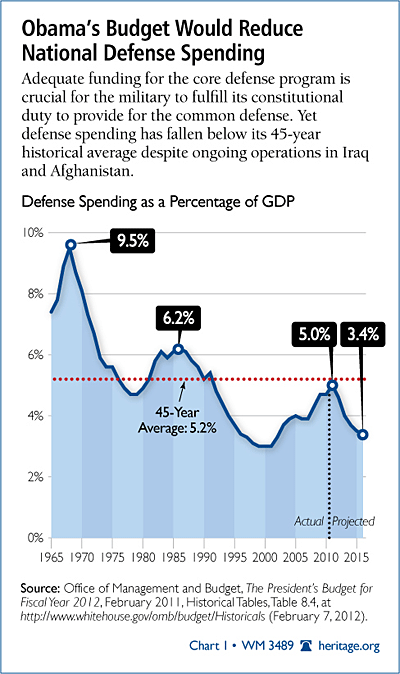Last week, six U.S. Senators, including John McCain (R–AZ) and Jon Kyl (R–AZ), endorsed draft legislation that would block the automatic defense cuts mandated by the Budget Control Act of 2011for fiscal year (FY) 2013. Under their proposal, those additional cuts to the Pentagon would be offset by targeting spending reductions elsewhere in the federal workforce. Finding alternatives to cutting essential military capabilities without raising taxes or further ballooning the federal deficit is prudent and necessary.
Readiness Crisis in the Making
Even without the additional mandated cuts imposed by the Budget Control Act of 2011, the President has directed significant reductions in defense that raise concerns about the ability of the armed forces to safeguard U.S. national security. The bipartisan panel chartered by Congress in 2010 to review the Pentagon’s Quadrennial Defense Review report concluded that the armed forces lacked the capacity to meet the responsibilities of protecting U.S. interests worldwide. Nevertheless, under the Administration’s recently announced defense strategic guidance, the U.S. military will be required to further divest the capacity to robustly defend U.S. interests around the world.

In a few years, for example, rushing ships to deter a crisis like blocking the Strait of Hormuz could leave the U.S. short in safeguarding other interests at sea. We would have a Navy and Coast Guard so stretched that they would not be able to protect U.S. sovereignty at sea, from patrolling fisheries to stopping seaborne smuggling. Our coasts could well become as porous as our borders.
The U.S. will have to contemplate missions where the Air Force cannot guarantee it can control the skies. The Marines will not have enough ships to deploy their force. The Army will scramble to find the resources to meet all its tasks for training and supporting missions worldwide. The Pentagon has already drastically cut the number of dedicated and specially trained and equipped Army forces to deal with disasters here at home. Withdrawing from Afghanistan and Iraq will not help redress the growing imbalance between missions and capabilities. Those forces are being cut away as part of debt reduction.
The additional cuts mandated in FY 2013 by the Budget Control Act of 2011 will exacerbate the decline of American military power. The Administration has stated it will not include the reductions in its presidential budget submission for the Defense Department in 2013. As a result, if cuts are imposed automatically, they will directly and adversely affect the Pentagon’s effort to maintain trained and ready forces. Even if this funding is restored in subsequent years, the negative impact of these additional cuts will be enduring. Training days lost cannot be recovered. Deferred maintenance only adds to the challenge of fixing and maintaining equipment in a cost-effective manner. Delays in buying new equipment drive up costs. All these additional expenses will be layered on top of long-range budget plans that are already chronically underfunded for critical defense needs.
Playing Chicken with Defense
While the Administration has acknowledged that the strategic guidance it just issued cannot be implemented if the Budget Control Act reductions are applied to defense, the White House and its supporters continue to hold national security hostage to press for tax increases. According to a recent report by Bloomberg News, Senator Carl Levin (D–MI), who chairs the Senate Armed Services Committee, has declared he would not support any approach that does not include tax increases to offset the defense cuts. Likewise, the President has stated he would veto any bill that sought to exempt the Pentagon from cuts under the Budget Control Act.
Using the threat of compromising national security to force Congress to raise taxes is an unacceptable tactic. Congress ought to propose a prudent and responsible alternative.
Stop the Bleeding
It is not necessary to use national security as a hostage in the debate over tax policy. The Senators who have proposed offsetting cuts that will directly impact military readiness and capabilities by putting other constraints on the federal workforce offer an alternative approach. There is similar legislation in the House.
Ensuring that national security is not compromised should be one of Congress’s top priorities. That said, Congress ought to find the most expeditious means to achieve that end. In the short term, the best answer might be crafting legislation granting the Administration flexibility in implementing mandated reductions in spending on the federal workforce. It is past time for the Administration and Congress to undertake systematic reforms to rein in the cost and size of the federal workforce and assure that government can fully meet its obligation to provide for the common defense. Both these efforts should proceed in tandem.
James Jay Carafano, Ph.D. , is Deputy Director of the Kathryn and Shelby Cullom Davis Institute for International Studies and Director of the Douglas and Sarah Allison Center for Foreign Policy Studies, a division of the Davis Institute, and Alison Acosta Fraser is Director of the Thomas A. Roe Institute for Economic Policy Studies, at The Heritage Foundation.



